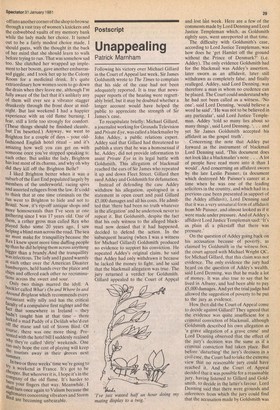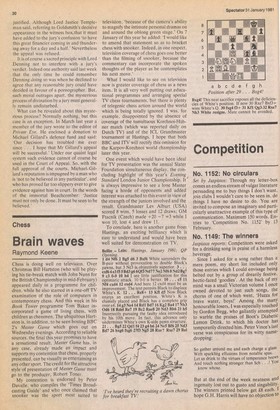Postscript
Unappealing
Patrick Marnham
Following his victory over Michael Gillard in the Court of Appeal last week, Sir James Goldsmith wrote to The Times to complain that his side of the case had not been adequately reported. It is true that newspaper reports of the hearing were regrettably brief, but it may be doubted whether a longer account would have helped the public to appreciate the strength of Sir James's case.
To recapitulate briefly: Michael Gillard, a journalist working for Granada Television and Private Eye, was called a blackmailer by John Addey, a public relations expert. Addey said that Gillard had threatened to publish a story that he was a homosexual if he, Addey, did not provide information to assist Private Eye in its legal battle with Goldsmith. This allegation of blackmail reached the ears of Sir James who repeated it up and down Fleet Street. Gillard then sued Addey and Goldsmith for defamation.
Instead of defending the case Addey withdrew his allegation, apologised in a statement in open court and paid Gillard 15,000 damages and all his costs. He admitted that 'there had been no truth whatever in the allegation' and he undertook never to repeat it. But Goldsmith, despite the fact that his only witness to the alleged blackmail now denied that it had happened, decided to defend the action. In the subsequent hearing (when I was a witness for Michael Gillard) Goldsmith produced no evidence to support his conviction, lie repeated Addey's original claim, he said that Addey had only withdrawn it because he lacked the money to tight, and he said that the blackmail allegation was true. The jury returned a verdict for Goldsmith. Gillard appealed to the Court of Appeal 'I've just wasted half an hour doing my mating display to a twig.' and lost hist week. Here are a few of the comments made by Lord Denning and Lord Justice Templeman which, as Goldsmith rightly says, went unreported at that time.
The difficulty with Goldsmith's case, according to Lord Justice Ternpleman, was how does he 'get Hamlet off the ground without the Prince of Denmark'?' (i.e. Addey). The only evidence Goldsmith had for the blackmail was Addey's assertion, later sworn as an affidavit, later still withdrawn as completely false, and finally realleged. Addey, said Lord Denning, was therefore a man in whom no credence can be placed. The Court could understand why he had not been called as a witness. `No ,one', said Lord Denning, `would believe a word he said'. 'He was not to be believed in any particular', said Lord .Justice Templeman. Addey 'told so many lies about so many things', said Lord Denning, . . and yet, Sir James Goldsmith accepted his affidavit as the gospel truth'.
Concerning the note that Addey put forward as the instrument of blackmail Lord Denning said, 'This document does not look like a blackmailer's note . . . A lot of people have read more into it than would'. And concerning an affidavit sworn by the late Leslie Paisner, (a document which destroyed Mr Paisner's career at a time when he was one of the leading solicitors in the country, and which had in a previous case been presented in support of the Addey affidavit), Lord Denning said that it was a very unnatural form of affidavit from Mr Paisner, and almost looked as if it were made under pressure. And of Addey's affidavit Lord Justice Tetnpleman said: It's as plain a a pikestaff that there was pressure.'
On the question of Addey going hack on his accusation because of poverty, as claimed by Goldsmith in the witness box, the court agreed with Michael Wright QC, for Michael Gillard, that this claim was not evidence. The only evidence the jury had heard on the question of Addey's wealth, said Lord Denning, was that he made a lot of money. It was also true to say that he lived in Albany, and had been able to pay £5,000 damages. And yet the trial judge had allowed the suggestion of poverty to be put to the jury as evidence.
How Then did the Court of Appeal come to decide against Gillard? They agreed that the evidence was quite insufficient for a criminal conviction of blackmail, although Goldsmith described his owfl. allegation as 'a grave allegation of a grave crime' and Lord Denning observed that the effect of the jury's decision was the same as if a criminal conviction had taken place. But before `disturbing' the jury's decision in a civil case, the Court had to take the extreme view that no reasonable jury could have reached it. And the Court of, Appeal decided that it was possible for a reasonable jury, having listened to Gillard and Goldsmith, to decide in the latter's favour. Lord Denning said that there were grounds and inferences from which the jury could find that the accusation made by Goldsmith was
justified. Although Lord Justice Templeman said, referring to Goldsmith's decisive appearance in the witness box,that it must have added to the jury's confusion `to have this great financier coming in and thundering away for a day and a half.' Nevertheless the appeal was refused.
It is of course a sacred principle with Lord Denning not to interfere with a jury's verdict. Indeed one authority said last week that the only time he could remember Denning doing so was when he declined to agree that any reasonable jury could have decided in favour of a pornographer. But,. such moral outrages apart. the mysterious process of divination by a jury must generally remain undisturbed.
What can be revealed about this mysterious process'? Normally nothing, but this case is an exception. In March last year a member of the jury wrote to the editor of Private Eye. He enclosed a donation to Michael Gillard's defence fund and said: 'Our decision has troubled me ever
since . I hope that Mr Gillard's appeal will be successful.' Under our quaint legal
• system such evidence cannot of course be used in the Court of Appeal. So. with the full approval of the courts. Michael. Gillard's reputation is impugned by a man who is 'not to be believed in any particular'. and who has proved far too slippery ever to give evidence against him in court. In the words of the immortal Beachcomber: 'Justice must not only be done. It must be seen to be believed.'







































 Previous page
Previous page